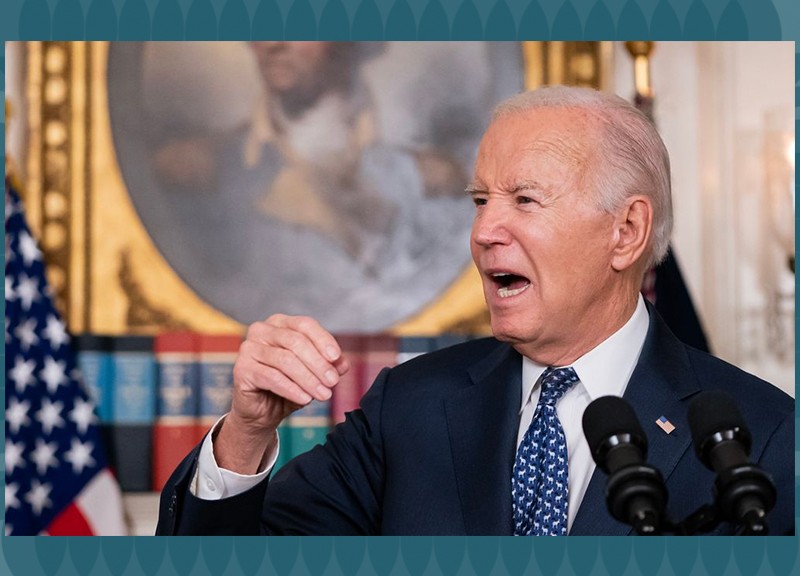
The president has moved away from reversals on Unrwa, the Houthis, Iran sanctions and more.
By David Schenker, WSJ
After reports last month that at least a dozen employees of the United Nations Relief and Works Agency participated in Hamas’s Oct. 7 massacre of 1,200 Israelis, the Biden administration suspended funding to the organization. Mr. Biden was likely loath to cut the aid. His administration announced with great fanfare 2½ years ago that it would resume the nearly $320 million year in U.S. assistance to Unrwa, which President Trump had zeroed out in 2018.
Mr. Biden’s reversion to the Trump policy on Unrwa is the latest in a series of U-turns on the Middle East. As security has deteriorated across the region, the White House has adopted the once-maligned policies of its predecessor toward Iran and its proxies.
The Houthis in Yemen are one example. In January 2021, during the final days of the Trump administration, Secretary of State Mike Pompeo designated the Houthis a foreign terrorist organization. The precipitating incident was a Dec. 30, 2020, attack on the Aden airport, including a plane carrying members of Yemen’s U.N.-recognized governing cabinet. The Houthis had a record of targeting Saudi civilians as well as international shipping in the Red Sea.
At the time, some Democrats accused Mr. Pompeo of tying the hands of the incoming administration. While the Houthis met the criteria for designation as a foreign terrorist organization, the Biden transition team worried that the designation might trigger a famine in Yemen, undermine Saudi-Houthi peace talks, and scuttle U.S. efforts to re-enter a nuclear deal with Tehran. In its first major foreign-policy decision, on Feb. 16, 2021, the Biden administration took the Houthis off the list despite the group’s continuing terrorist activities.
Yet as the Houthis launched more missiles and drones toward Israel and harassed commercial ships in the Red Sea, the administration reassessed its position. On Jan. 17, Secretary of State Antony Blinken named the Houthis a specially designated global terrorist group, a slightly less onerous classification than foreign terrorist organization.
The Jan. 28 drone attack by the Iran-backed Iraqi Hashd Shiite militia that killed three U.S. soldiers in Jordan has the Biden administration reportedly reviewing its approach to sanctions against Tehran. After the Trump administration withdrew in 2018 from the Iran nuclear deal, Washington engaged in a maximum pressure campaign against the theocracy. But Mr. Biden, seeking a return to the deal and de-escalation, abandoned the Trump sanctions and unblocked billions of frozen regime funds.
According to the influential Saudi-funded news service Iran International, the administration is in talks with Western partners to “intensify sanctions against Tehran.” This report and other accounts of growing frustration with Tehran in the European Union suggest that Mr. Biden may even move to restore the coercive multilateral economic measures in place before the Iran deal.
Until recently, to avoid confrontation with Baghdad—which is politically allied with many of these Iran-backed militias—Mr. Biden had responded to Hashd attacks on U.S. military and diplomatic personnel in Iraq by retaliating against these forces in Syria. But as the assaults intensified, in late 2023 the Biden administration resumed Mr. Trump’s practice of striking back within Iraqi territory.
Mr. Biden’s return to Trump-era policies comes after three years of trial and mostly error. His approach to Iran featured a failed effort to return to the nuclear deal, lax application of sanctions, repeated releases of frozen assets, and a general disinclination toward conflict with the theocracy and its proxies.
Mr. Trump’s Iran policy wasn’t as strong as it should have been. His administration exerted economic pressure on Tehran but didn’t respond militarily to the regime’s provocations in 2019, including scuttling ships in Emirati ports, downing a U.S. drone in international airspace, and attacking Saudi Aramco operations in Abqaiq and Khurais. Ultimately, the sanctions didn’t succeed in restarting nuclear negotiations with Iran for a better deal. But the Trump administration understood that proxies were part of the Iran problem. To that end, it supported the Saudis in their war against the Houthis, targeted the Hashd, and periodically attacked the proxies’ Iranian masters.
The Biden administration’s latest policy reversals, along with targeting the Hashd and Houthi militias, may suggest a new, comprehensive understanding of the Iran problem. Tehran exploited Oct. 7 by coordinating a campaign to drive the U.S. from the Middle East. If America is to remain there and protect its allies and interests, Washington needs a strategy that raises the cost for the proxies as well as their puppet master. While a tougher U.S. diplomatic and military approach entails some risk, Iran’s fears of escalation give Washington latitude to act more boldly.
Mr. Schenker, a senior fellow at the Washington Institute for Near East Policy, served as assistant secretary of state for near eastern affairs, 2019-2021.














